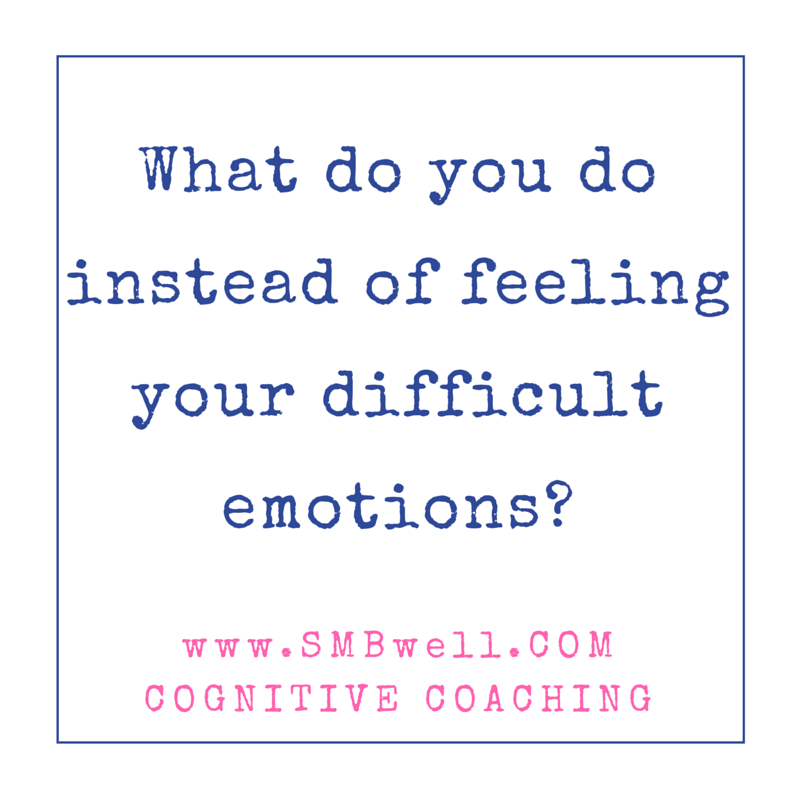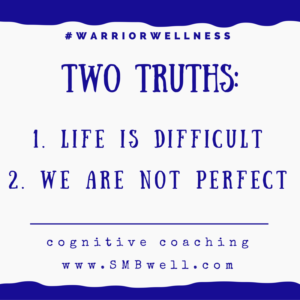Life is difficult. We are not perfect.
These two truths collide every day. What do you do when they do? Ideally, we act as a compassionate observer (or watcher) of our mind. We feel our feelings, determine which thought generated our feeling, and choose an appropriate action. Realistically? We haven’t taken care of our 5 pillars of wellness, aren’t operating at our highest level and choose to distract ourselves from our feelings (and life) instead.
What do you do to avoid or distract yourself from the difficult emotions or times in your life?
- Eat
- Nap
- Drink
- Go on your phone
- Watch Netflix
- Make excuses
- Blame someone else for what’s going on
- Yell at our kids or partner
- Shop
- Complain
Why do we do these things?
Simple. They work.
Problem is, they only work in that moment, and for the immediate short term. Don’t get me wrong, sometimes it’s necessary to distract ourselves. Here are two examples when distraction is a wise short-term choice:
->If you’re at a family dinner and something is said that leaves you feeling sad, disconnected, or miserable, it’s best for you to process that emotion alone. Why? So you can choose your action versus react in the moment. Choosing your action feels empowered. Reacting feels impulsive and out of control. The difference here? If you snap back at your mom in front of everyone, how do you feel? If you process what was said, your role in it, and any background drama later and then choose to address the person that said something, how do you feel? Very differently.
->If you’re at work and a co-worker says something that leads you to feel distraught, cheated, or disgruntled, it’s best to pause before speaking or typing. Why? Again, so you can choose your action instead of reacting in the moment. If you snap back at your colleague, how do you feel? Do you feel differently if you pause to ask yourself: “What is this all about?”, “What might be going on here that got him/her to say that?”?
When you can’t stop to feel and process the emotion, it’s crucial to pause so as to avoid reacting in that moment. The ability to pause before reacting is a tool you can use every single day. Learning to pause before reaching for the food or blurting something out takes practice. It’s something I work on every single day. When learning a new skill, remember: We are not perfect. Life is difficult. You will react. You will be in a situation where you won’t pause. Instead of beating yourself up for it, look at what happened as that compassionate observer: “How interesting. I wonder why I reacted that way? What could I have done differently?”
What if you can stop to feel a difficult feeling? How do you process it? Two simple steps:
- Describe where in your body you feel your feeling. Turn off your adult mind and pay attention to your physical body. What does rage feel like in your body? What does betrayal feel like? The more details, the better.
- Sit & Surrender: Sit and allow yourself feel the feeling in your body. Feelings are vibrations in our body and they will pass when you open yourself up to physically feeling them. I’ll bet you’ve broken a bone or had a child. How does that physically feel? If you could handle that, you can handle the physical feeling of grief, rage, confusion, angst. Surrender.
The truth is, we distract ourselves far more frequently than is necessary. We hide from our strong emotions (fear, sadness, loneliness, grief, unease, confusion, etc), making excuses for why we can’t feel that feeling right then. Why? There are a whole host of personal reasons and that’s why it’s great to get a coach. Big picture? We’ve been taught that being emotional is a weakness or is somehow bad. Nonsense! Do you know what makes us weak? Pushing down our emotions, ignoring what’s going on around us, putting our brain on an interminable pause so as to get through our days without rocking the boat.
Our question for today: Where in your life are you pushing away your feelings? Why?






